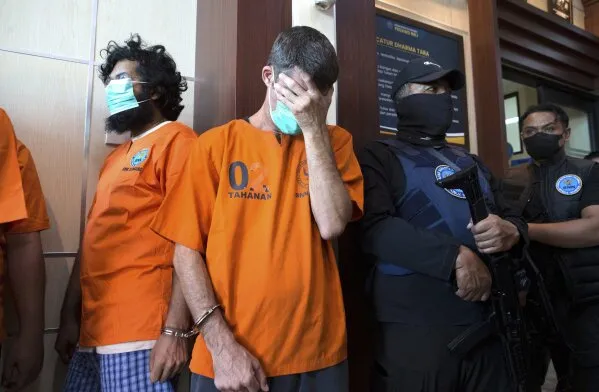Bali’s Drug Crackdown: Foreign Nationals Arrested on Serious Charges
Bali, Indonesia, renowned for its stunning beaches, rich culture, and vibrant nightlife, has recently made headlines for a troubling reason. Law enforcement authorities have increased their efforts to combat drug trafficking in the region, resulting in multiple high-profile arrests of foreign nationals. Among those detained are three British nationals who now face the possibility of the death penalty due to their alleged involvement in smuggling cocaine into the country. Meanwhile, an Australian man has been arrested for drug possession, further highlighting the island’s strict anti-drug laws.
The Arrests: A Closer Look
The recent spate of arrests began with the apprehension of the three British nationals, who were reportedly caught attempting to smuggle significant amounts of cocaine into Bali. According to local authorities, during a routine inspection at the Ngurah Rai International Airport, customs officials discovered the illicit drugs concealed within the passengers’ luggage. The quantity of cocaine allegedly involved is substantial enough to warrant the most severe penalties under Indonesian law.
Indonesian law is notoriously harsh when it comes to drug-related offenses. Under the current legal framework, drug trafficking can lead to one of the harshest punishments available – the death penalty. For individuals caught with substantial amounts of illicit substances, the penalties become even more severe. This reality poses a considerable risk for foreign nationals who may underestimate the severity of drug laws in Indonesia, particularly unwitting tourists who might not fully understand the legal implications associated with illegal drugs.
The Death Penalty for Drug Traffickers
Legal analysts indicate that the three British suspects could face execution by firing squad if convicted on drug trafficking charges. The death penalty has been a controversial issue both in Indonesia and on the international stage. While many countries have abolished capital punishment, Indonesia has retained it, especially for drug offenses. The rationale behind this hardline approach is to deter drug trafficking, which authorities argue is fueling violence and social decay in the country.
In recent years, the Indonesian government has made headlines with its zero-tolerance policy towards drug offenses. Notable cases in the past have included the executions of several foreign nationals for drug trafficking, drawing international condemnation from human rights advocates. Such actions are often viewed as a demonstration of the country’s commitment to eradicating the drug trade at any cost.
The Implications of Drug Laws on Foreign Nationals
Foreign nationals traveling to Indonesia, especially to tourist hotspots like Bali, should be acutely aware of the strict drug laws that govern the country. Many tourists may feel emboldened in a carefree environment often associated with relaxation and indulgence, but failing to recognize the gravity of drug laws can lead to life-altering consequences.
The Australian man arrested for drug possession serves as yet another stark reminder. According to Indonesian police, he was taken into custody after a search revealed a small amount of illegal drugs in his possession. While he is not facing charges as severe as drug trafficking, he still may deal with substantial legal repercussions and lengthy jail time under the country’s stringent drug laws.
Cultural and Legal Context
Indonesia’s legal stance on drugs is shaped significantly by cultural perceptions surrounding narcotics and their usage. The nation has faced persistent challenges with drug abuse and trafficking, which have had a direct impact on public health and safety. The sociopolitical landscape reflects a collective decision to prioritize national integrity over individual human rights when it comes to drug-related offenses.
The rapid rise in substance abuse among the youth has propelled the government to take a hard line against drugs, resulting in aggressive law enforcement and comprehensive campaigns to deter drug use and trafficking. Educational programs emphasizing the dangers of drug use have been initiated alongside strict enforcement mandates which have led to public support for harsh penalties.
International Reaction and Human Rights Concerns
The international community has responded mixedly to Indonesia’s harsh drug laws. Human Rights organizations routinely criticize executions and severe penalties for drug offenses, arguing that they violate fundamental human rights and overlook rehabilitation opportunities for addicts. Advocates contend that harsh penalties disproportionately affect vulnerable populations, contributing little to actual improvements in public safety.
Despite the outcry, Indonesia remains steadfast in its approach, viewing drug trafficking as a significant threat to national security. The presence of foreign nationals among recent arrests adds a layer of complexity, as nations sometimes intervene to ensure their citizens receive fair treatment under foreign laws. Diplomatic channels may become involved, often resulting in significant scrutiny from the public on both sides.
Looking Forward: Changes on the Horizon?
As you observe the ongoing situation in Bali and broader Indonesia, one must question whether there will be any shifts in policy or pressure that could lead to reforms in drug laws. The death penalty’s continued application is contingent upon public sentiment, government priorities, and international relations, all of which can fluctuate over time.
Legal experts often suggest that while immediate changes in severe penalties may not be on the horizon, there could be movements towards more comprehensive drug education and rehabilitation alternatives to address the underlying issues of drug abuse in society. Activists call for a more balanced approach that combines law enforcement and health-oriented solutions, reducing reliance on capital punishment.
Final Thoughts
The arrests of foreign nationals in Bali unfold against the backdrop of Indonesia’s unwavering stance on drug-related offenses. The implications of such actions are profound not only for those directly involved but also serve as a cautionary tale for foreign tourists navigating the vibrant yet perilous landscapes of Bali. As the saga continues to develop, the world watches closely, awaiting any forthcoming changes that may redefine Indonesia’s approach to drug-related crimes.
Foreign travelers to Indonesia must remember the country’s stringent drug laws and the life-changing consequences that can arise from drug-related offenses. Maintaining awareness and exercising caution can go a long way in ensuring a safe and enjoyable visit to this beautiful island.







